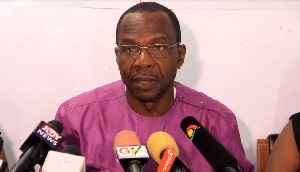 GJA president, Roland Affail Monney
GJA president, Roland Affail Monney
The 23rd Ghana Journalists Awards held last weekend in Accra has lost its key message.
The thrust has been submerged by the celebrations of the award winners.
So let us quickly recap.
The theme chosen was, ‘State of Investigative Journalism: Boundaries of Privacy and Borders of the Public Interest’.
Her Ladyship Justice Sophia Akufo, the chief justice (CJ), who was the keynote speaker, delivered a forthright message on the theme.
‘You cannot break into somebody’s house and install cameras claiming you are conducting an investigation in the interest of the public.’
Ghanaweb.com reported the CJ as saying further that considering the fluid nature of the subject [investigative journalism], journalists must be guided by their professional code of ethics and they must know where their rights end and where another person’s rights begin.
‘The outcome of an investigative report should not be judgemental and journalists should not take positions as is sometimes done in their reports.’
It is important to clarify this point; the CJ is talking about news reports, not editorials/opinions.
Do not conjure, simulate or invent news; let news happen and then report it.
In the words of Professor Kwasi Ansu-Kyeremeh from the title of his inaugural lecture at University of Ghana, Legon, Ka Nea W’ahu– Report What You Have Seen.
The CJ gave a solution; the GJA Code of Ethics should be reviewed periodically to ensure that it is in sync with the changing trends.
The GJA Code of Ethics first came into use in 1994.
It was reviewed and launched last year.
At the launch, Roland Affail Monney, the GJA president, said that the new document had taken into consideration possible ethical breaches.
What do the relevant portions say about investigative journalism?
‘A journalist: – at all times upholds and defends the principles of media freedom and independence.
– reports the truth at all times.
– upholds the public interest and the right of the public to be informed.
– does not suppress news, information and materials on the basis of threats, inducements, and individual preferences or for personal gain.
– obtains information, videos, ideas, data, photographs and illustrations only by honest, straightforward, fair and open means- unless otherwise tampered by public interest considerations.
– Does not intrude on anybody’s private life, grief or distress unless justified by overriding consideration of public interest.
– ensures that photographs and multimedia contents adequately reflect an event and do not highlight an event out of context.’
These eight provisions out of 24 should guide all of us playing various roles in the media.
It is but important that lay people also know these ethical guidelines by which all journalists, especially investigative journalists should conduct their affairs.
We are happy and willing to publicise this code of ethics.
It is interesting to know that at the formal launch of the Code, Roland Affail Monney, the GJA president remarked, ‘…devoid of any campaign drive, the new code is one of the legacies bequeathed to the media fraternity’.
Now you have it.
And you know all the trending issues on investigative journalism in Ghana.
But do not rush to give a verdict yet, for at the GJA Awards ceremony, the CJ said that all pronouncements of guilt or otherwise are the prerogative of a court of competent jurisdiction in line with the rule of law and the unerring principles of natural justice.
Now what do you say?
Feedback: ato@writersghana.com